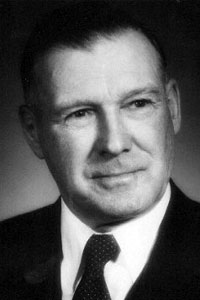James Drysdale Deveson was born, raised and educated in the Inkerman School District. After finishing school, Jim stayed on the farm and helped his father. In 1936 he married Doris Ross and they raised a son and three daughters. In 1961, when his father died, he began to operate the mixed farm. He practised good soil management and conservation. The Deveson farm became a working model for agricultural students.
Mr. Deveson contributed much to Manitoba. He was a farmer, a business leader and a community worker. The very significant contribution was his thirty-five years of dedicated service to the Manitoba Pool Elevators. His involvement started when he was elected Director of the Arden Co-operative Elevator Association in 1945 and ended when he retired as President of the Manitoba Pool in 1980. In 1956 he expanded his involvement in the Pool by being elected director of the organization. He liaised between the Board and the membership. Jim represented the M.P.E. with its business affiliates: insurance, livestock, grain, and fertilizer. He also worked with farm associates: Wheat Producers, Farm Bureau and Co-operative Council.
In 1977 he attended the International Federation of Agricultural Producers Conference in Helsinki, Finland and the following year was made advisor to the government at the international meeting in Geneva, Switzerland. Because of his vast knowledge of the grain business, he was appointed to the Senior Grains Transport Committee by the Government of Canada.
One of his outstanding attributes was his ability to recognize the need for change. He saw that changes in the transportation and export systems had to happen. He also knew that farmers had to have in-put through discussion, so that the adjustments wouldn’t be crippling to the agricultural community.
Mr. Deveson served the community: on church boards, school boards, Oddfellows Lodge, Beautiful Plains Agricultural Society, and as Director and President of the Neepawa Rotary Club. His friends and colleagues remember him as one dedicated to his family, and ready to give a helping hand whether with advice, counsel or moral support. Jim was willing to listen, to consult, to provide leadership, and to clearly state his position on controversial issues. He dedicated his life’s work to the betterment of farming, to agriculture in general and to his community.


